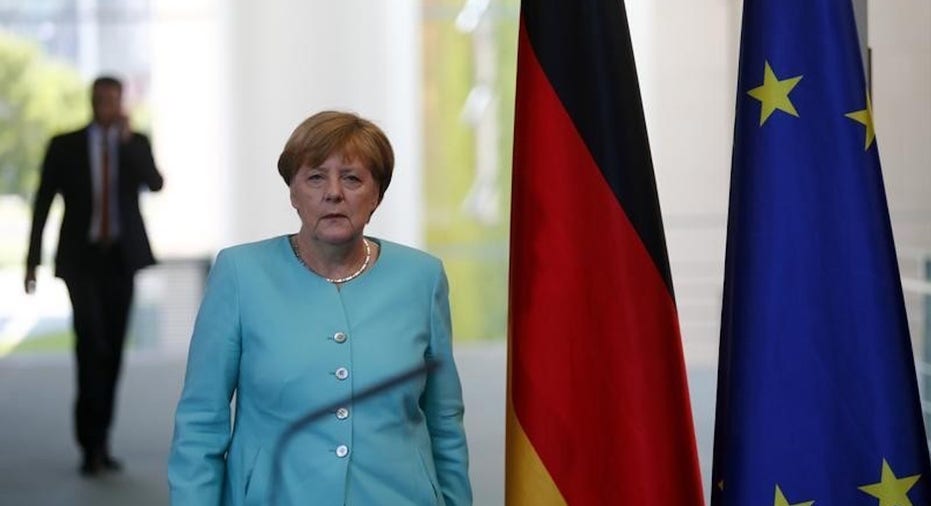Merkel Calls for Sober EU Divorce Talks with 'Partner' Britain

German Chancellor Angela Merkel called on Saturday for clear-headed negotiations with Britain on its departure from the European Union, stressing that talks with the "close partner" must take place in a good atmosphere.
Merkel's reasoned approach came despite a call from foreign ministers from the EU's six founding members for Britain to leave the bloc as soon as possible after Britons voted to quit in the biggest blow to the project since World War Two.
"The negotiations must take place in a businesslike, good climate," Merkel told a news conference after a meeting of her conservative party in Hermannswerder, outside Potsdam to the west of Berlin.
"Britain will remain a close partner, with which we are linked economically," she said, adding that there was no hurry for Britain to invoke Article 50 of the EU treaty -- the move it must make to set in motion the process to exit the bloc.
"Quite honestly, it should not take ages, that is true, but I would not fight now for a short time frame," Merkel said.
To the north of the German capital, the six foreign ministers struck a more urgent tone, pressing Britain to trigger the process for exiting the bloc after Britons voted by 52-48 percent to exit the EU, which it joined more than 40 years ago.
"We now expect the UK government to provide clarity and give effect to this decision as soon as possible," the ministers from Germany, France, Italy, the Netherlands, Belgium and Luxembourg said in a joint statement.
It is up to Britain to set in motion this process to exit the bloc.
In London, Matthew Elliott, chief executive of the Vote Leave campaign, said Britain should begin informal negotiations on a full settlement governing its post-Brexit relationship with the EU before invoking Article 50 of the Lisbon Treaty.
FRENCH PRESSURE
France pressed for a swift start to the exit process.
French Foreign Minister Jean-Marc Ayrault said the negotiations with Britain must move quickly and the remaining EU member states also needed to give fresh impetus to the project.
"We have to give a new sense to Europe otherwise populism will fill the gap," he said, stressing that the EU could not wait for British Prime Minister David Cameron to depart in October before the exit process begins.
Ayrault said other EU leaders would put "a lot of pressure" on Cameron at a summit meeting next Tuesday to act quickly.
In Colmar in eastern France, French President Francois Hollande said the separation "will be painful for Britain but ... like in all divorces, it will be painful for those who stay behind too."
France and Germany have drafted a 10-page paper mapping out three areas of immediate concern for the remaining EU members: security, migration and refugees, and jobs and growth.
Diplomatic sources say they want use this as a basis to shore up the EU, while building a more flexible union that recognizes some members have less appetite to deepen integration than others.
Global stock markets plunged on Friday, and sterling saw its biggest one day drop in more than 30 years after the British vote to leave the EU. Ratings agency Moody's downgraded its outlook for Britain.
The six foreign ministers lamented the watershed brought by Thursday's 'Brexit' vote and said the EU was losing "not just a member state but history, tradition and experience."
Luxembourg Foreign Minister Jean Asselborn told Reuters: "I believe you can destroy the European Union with referenda. We have to communicate better what the EU is done and we have to work harder on issues such as migration where we have failed."
Both Ayrault and Asselborn warned Britain not to play games by drawing out the exit process.
"There's no reason to play a cat and mouse game. That would not be respectful after deciding to organize this referendum," Ayrault told a news conference after the ministers' meeting.
"It's in Britain's interest and in the interest of Europeans not to have a period of uncertainty that would have financial consequences, and that could have economic and political consequences," he said.
(Additional reporting by Andrea Shalal in Berlin, Ingrid Melander and Jean-Baptiste Vey in Paris, Gilbert Reilhac in Colmar and Robert-Jan Bartunek in Brussels.; Writing by Paul Carrel; Editing by Alexander Smith and Jane Merriman)



















